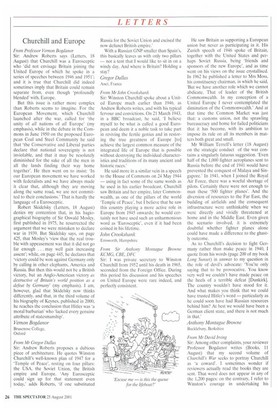Churchill and Europe
From Professor Vernon Bogdanor Sir: Andrew Roberts says (Letters, 18 August) that Churchill was a Eurosceptic who 'did not envisage Britain joining the United Europe of which he spoke in a series of speeches between 1946 and 1951'; and it is true that Churchill did indeed sometimes imply that Britain could remain separate from, even though 'profoundly blended' with, Europe.
But this issue is rather more complex than Roberts seems to imagine. For the European Movement. which Churchill launched after the war, called for 'the unity of all nations of all Europe' (my emphasis), while in the debate in the Commons in June 1950 on the proposed European Coal and Steel Community he said that 'the Conservative and Liberal parties declare that national sovereignty is not inviolable, and that it may be resolutely diminished for the sake of all the men in all the lands finding their way home together'. He then went on to insist: 'In our European movement we have worked with federalists and we have always made it clear that, although they are moving along the same road, we are not committed to their conclusions.' That is hardly the language of a Eurosceptic.
Robert Skidelsky (Letters, 18 August) denies my contention that, in his hagiographical biography of Sir Oswald Mosley, first published in 1975, he resurrected the argument that we were mistaken to declare war in 1939. But Skidelsky says, on page 425, that Mosley's 'view that the real trouble with appeasement was that it did not go far enough . . may well gain increasing assent'; while, on page 445, he declares that 'victory could be won against Germany only by calling in other elephants, America and Russia. But then this would not be a British victory, but an Anglo-American victory as destructive of Britain's world position as a defeat by Germany' (my emphasis). I am, however, glad that Skidelsky now thinks differently, and that, in the third volume of his biography of Keynes, published in 2000, he reaches the conclusion that Hitler was 'a moral barbarian' who 'lacked every genuine attribute of statesmanship'.
Vernon Bogdanor
Brasenose College, Oxford


























































 Previous page
Previous page